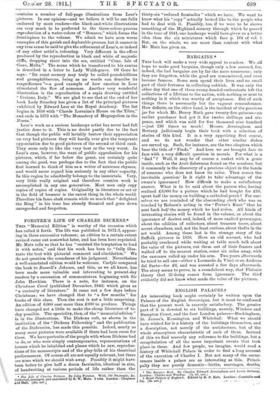BARGAINS. *
THIS book will make a very wide appeal to readers. We all hope to make good bargains, though only a few succeed, for, indeed, the bad bargains are by far the more numerous ; only they are forgotten, while the good are remembered, and even become famous. Some men spend their lives and no small part of their fortunes in collecting rubbish. It was only the other day that one of these wrong-beaded enthusiasts left the collections of a lifetime to the nation, with nothing or next to nothing in it which was worthy of acceptance. But of such things there is necessarily but the vaguest remembrance. How definite, on the other hand, is the incident of the precious jar for which Mr. Henry Huth gave twenty-five guineas—an earlier purchaser had got it for twelve shillings and six- pence, and which was sold for five thousand nine hundred —just 236 times as much 1 Messrs. Jerningham and Bettany judiciously begin their book with a selection of stories of this kind. It is a very appetizing first course, and we do not wonder that other similar dishes are served up. Such, for instance, are the two chapters which bear the title of "Finds." And here we are brought face to face with a very difficult question in morals. For what is a " find " ? 'Well, it may be of course a casket with a genie inside, such as the Arab fisherman found on the seashore, but it commonly is the discovery of a precious object in the hands- of someone who does not know its value. Then comes the inevitable question: Is it right to take- advantage of the owner's ignorance? How difficult to make a satisfactory answer. What is to be said about the parson who, having realized £3,000 for a picture which he had bought for £10, spent half the money on building a cathedral porch ? For our- selves we are reminded of the absconding clerk who was so touched by Robson's acting in the "Porter's Knot" that he sent back half the money which be had stolen. All kinds of interesting stories will be found in the volume, as about the ignorance of dealers and, indeed, of more exalted personages, about the oddities of collectors, about treasure trove, about secret chambers, and, not the least curious, about thefts in the art world. Among these last is the strange story of the Suffolk pictures in 1856. Here an old servant, who bad probably overheard while waiting at table much talk about the value of the pictures, cut them out of their frames and walked off to the nearest station, some six miles away, with the canvases rolled up under his arm. Two years afterwards he tried to sell one—either a. Leonardo da Vinci or an Andreas del Sarto—for £6, and was arrested a few days afterwards. The story seems to prove, in a roundabout way, that Platonic theory that ill-doing comes from ignorance. The thief evidently did not know what made the value of the pictures.










































 Previous page
Previous page